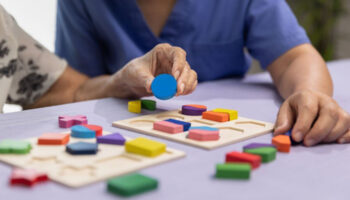As our loved ones age, it’s not uncommon for them to experience cognitive challenges, leading to confusion and concern for their well-being. Among the many conditions that can affect seniors’ cognitive health, delirium and dementia are often misunderstood and misidentified due to their overlapping symptoms. In this blog, we will delve into the world of seniors’ dementia, exploring its causes, types, and available treatments while enlightening on the distinctive features that set delirium apart from dementia. Additionally, we will take a closer look at how specialized senior living facilities like Athulya Assisted Living provide comprehensive care and support for seniors with cognitive conditions.
What is Delirium?
Delirium is a state of acute and severe confusion that occurs suddenly, often over hours or days. It is a medical condition characterized by changes in mental function and awareness, leading to disorientation, impaired attention, and altered cognition. Delirium is not a specific disease but rather a symptom of an underlying medical condition or trigger.
In seniors, delirium can be particularly concerning due to their age-related vulnerabilities. Older adults may have multiple chronic health conditions, take several medications, and have decreased physiological reserves, making them more susceptible to delirium. Common triggers of delirium in seniors include infections (e.g., urinary tract infections, pneumonia), medication side effects, surgery, electrolyte imbalances, and dehydration.
What is Dementia?
Dementia is a progressive and chronic cognitive decline that affects memory, thinking, reasoning, and behaviour. It is not a specific disease but rather collective symptoms caused by various underlying conditions. Dementia impairs a senior’s ability to function independently and can have a significant impact on their daily life, as well as their relationships with others.
Dementia is more commonly seen in older adults, although it is not a normal part of the ageing process. Alzheimer’s disease is the most common cause of dementia in seniors, accounting for around 60-80% of cases. Other types of dementia include frontotemporal dementia, Lewy body dementia, vascular dementia, and mixed dementia (a combination of different types).
How are Delirium and Dementia Different?
Delirium and dementia are both conditions that affect cognitive function, but they are different in several key ways:
- Onset:
Delirium: Delirium has a sudden and acute onset, often developing within a few hours or days. It is usually temporary and reversible once the underlying cause is addressed.
Dementia: Dementia has a gradual onset and is a progressive, chronic condition. It develops over months or years and leads to a steady decline in cognitive abilities.
- Duration of Impairment:
Delirium: Delirium causes fluctuations in mental status, with symptoms varying throughout the day. It may resolve once the underlying medical issue is treated.
Dementia: Dementia causes persistent cognitive decline, with symptoms becoming increasingly severe over time.
- Memory Impairment:
Delirium: Short-term memory is typically affected in delirium, but long-term memory remains relatively intact.
Dementia: Dementia leads to progressive memory loss, affecting both short-term and long-term memory.
- Underlying Causes:
Delirium: Delirium is usually triggered by an underlying medical condition, such as infection, medication side effects, or metabolic imbalances.
Dementia: Dementia is caused by various underlying brain conditions, with Alzheimer’s disease being the most common.
- Reversibility:
Delirium: Delirium is often reversible once the underlying cause is treated.
Dementia: Most types of dementia are not reversible and have no cure.
So, it is essential to differentiate between delirium and dementia, as they require different approaches to management and treatment. Delirium is a medical emergency, and identifying and addressing the underlying cause is crucial for a positive outcome. On the other hand, dementia requires long-term care and support to manage the progressive decline in cognitive abilities and maintain the senior’s quality of life.
What are the Treatments for Delirium and Dementia?
Treatment for Delirium:
- Identify and Treat Underlying Cause: The primary goal in treating delirium is to identify and address the underlying medical condition or trigger. This may involve treating infections, adjusting medications, correcting metabolic imbalances, or managing pain.
- Supportive Care: Providing a calm and safe environment can help manage delirium symptoms. Minimizing noise, providing adequate lighting, and promoting a regular sleep-wake cycle can improve the patient’s condition.
- Medications: In some cases, medications may be used to manage specific symptoms of delirium, such as agitation or anxiety. However, these are usually used sparingly and only when necessary.
- Family and Caregiver Education: Educating family members and caregivers about delirium and its management is essential for providing proper support and care to the senior.
Treatment for Dementia:
- Medications: There are medications available to manage certain symptoms of dementia, such as memory loss, confusion, and behavioural changes. These medications can help slow the progression of the disease and improve the senior’s quality of life.
- Cognitive Stimulation: Engaging in cognitive activities and exercises can help maintain cognitive function and slow the decline in memory and thinking skills.
- Behavioural Interventions: Behavioural therapies can be effective in managing challenging behaviours associated with dementia, such as agitation, aggression, and wandering.
- Supportive Care: Providing a supportive and structured environment is crucial for seniors with dementia. This may involve creating a daily routine, ensuring safety in the living space, and offering emotional support.
- Physical Exercise: Regular physical exercise has been shown to have positive effects on cognitive function and may help slow the progression of dementia.
- Memory Care Facilities: Memory care facilities, such as those provided by Athulya Assisted Living, offer specialized care and support for seniors with dementia. These facilities have trained staff who can address the unique needs of seniors with dementia and create a safe and supportive environment.
Athulya Assisted Living: A Home of Supportive Care:
Athulya provides extensive care and support for seniors with cognitive conditions by offering personalized care plans tailored to their needs. Their experienced caregivers are trained to provide memory care services, including cognitive stimulation activities and therapeutic interventions. They ensure that seniors with cognitive conditions receive the attention, compassion, and specialized care they require to enhance their overall well-being and quality of life.
Thus, Athulya Assisted Living stands as an ideal choice for seniors seeking a supportive and enriching environment. Whether through senior independent living or senior assisted living, Athulya is committed to promoting the well-being and serenity of seniors as they navigate the complexities of cognitive health.





